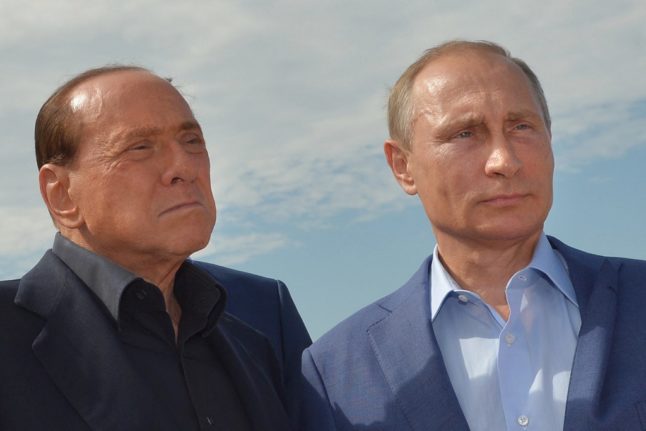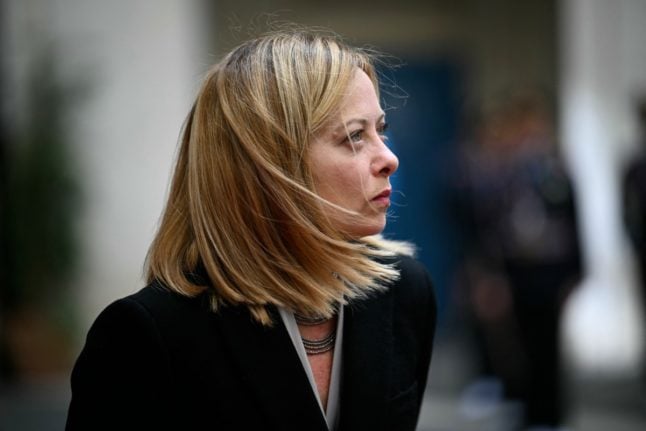After a tycoon bromance, Italy’s Silvio Berlusconi is struggling to break up with Russia’s Vladimir Putin over the Ukraine war — like many in his country, where ties with Moscow run deep.
The billionaire former premier’s unwillingness to speak ill of Putin is echoed by other leading Italian politicians, while in the media, there are concerns that pro-Russian sentiment has warped into propaganda.
Prime Minister Mario Draghi is committed to NATO and the EU, strongly backing sanctions against Moscow, and at his urging a majority of Italy’s MPs approved sending weapons to help Ukraine defend itself.
But much of Draghi’s coalition government — Berlusconi’s Forza Italia, Matteo Salvini’s League and the once anti-establishment Five Star Movement (M5S) — has long pursued a “special relationship” with Moscow.
Italy used to have the largest Communist party in the West, and many businesses invested in the Soviet Union in the 1960s, while Russians in turn sought opportunities here.
Barely a month before the February 24 invasion, Putin spent two hours addressing top Italian executives at a virtual meeting.
Beds, hats, parties
Berlusconi, 85, has been out of office for more than a decade but remains influential both in politics and through his media interests, as founder of the Mediaset empire.
He was an ardent admirer of the Russian leader, and a close chum — they stayed in each other’s holiday homes, skied together and were snapped sporting giant fur hats.
“They were two autocrats who mutually reinforced their image: power, physical prowess, bravado, glitz,” historian and Berlusconi author Antonio Gibelli told AFP.
Putin gave Berlusconi a four-poster bed, in which the Italian had sex with an escort in 2008, according to her tell-all book. He in turn gave Putin, 69, a duvet cover featuring a life-sized image of the two men.
In the months before the Ukraine war, Berlusconi continued to promote his close ties, including a “long and friendly” New Year’s Eve phone call.
It was not until April, two months after Russia’s invasion, that he publicly criticised the conflict, saying he was “disappointed and saddened” by Putin.
He has struggled to stay on message since then.
Speaking off the cuff in Naples last week, he said he thought “Europe should… try to persuade Ukraine to accept Putin’s demands”, before backtracking and issuing a statement in Kyiv’s support.
“Breaking the twinning with Putin costs Berlusconi dearly: he has to give up a part of his image,” Gibelli said.
Meanwhile, the leader of the anti-immigration League, Salvini, who has proudly posed in Putin T-shirts in the past, has argued against sending weapons to aid Ukraine.
The League did condemn Russia’s military aggression, “no ifs and no buts”, on February 24 when Russia invaded.
But an investigation by the L’Espresso magazine earlier this week found that, in the over 600 messages posted by Salvini on social media since Russia invaded, he had not once mentioned Putin by name.
He did so for the first time on Thursday, saying “dialogue” with Putin was good, and encouraging a diplomatic end to the war.
‘Biased media’
Many pro-Russian figures are given significant airtime in the media, which itself is highly politicised.
“Italy is a G7 country with an incredibly biased media landscape,” Francesco Galietti, founder of risk consultancy Policy Sonar, told AFP.
TV talk shows are hugely popular in Italy, and “one of the main formats of information” for much of the public, notes Roberta Carlini, a researcher at the Centre for Media Pluralism and Media Freedom at the European University Institute.
But she warns they often “obscure facts”.
Italy’s state broadcaster RAI is being investigated by a parliamentary security committee for alleged “disinformation”, amid complaints over the frequent presence of Russian guests on talks shows.
Commercial giant Mediaset is also in hot water after airing an interview with Russia’s Foreign Minister Sergei Lavrov in which highly polemical claims went unchallenged.
It defended the interview, saying good journalism meant listening to “even the most controversial and divisive” opinions.
“RAI is a reflection of the political landscape, with its many pro-Russian parties. And Mediaset… well, Berlusconi is an old pal of Putin’s, so what do you expect?” Galietti said.
He also points to a decades-long culture in Italy of allowing conspiracy theories — particularly on the interference of US spies in Italian politics — to circulate in the media unchallenged.
“You end up with a situation where Russia Today (RT) is considered as authoritative as the BBC,” he said.



 Please whitelist us to continue reading.
Please whitelist us to continue reading.
Member comments